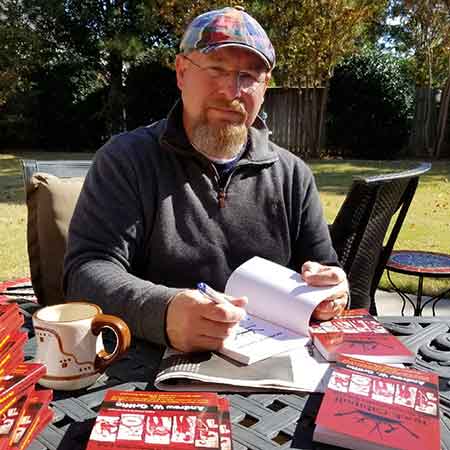By andrew w. griffin
Rock Catapult
1966: The Launch of Modern Rock and Roll
Andrew W. Griffin shares his unbridled enthusiasm and intricate knowledge of 1960s music, especially focusing on the poignant music of ’66, through this retrospective anthology. Griffin’s journalistic style helps the reader experience the behind the scenes synergy of each group inter-mixed with personal anecdotes.
Rock Catapult is also available in the following bookstores:
Books Ink – Crescent Shopping Center in Portland, Texas
By The Book – 702 Ayers St. Corpus Christi, Texas
Watermark Books – 4701 E. Douglas Ave. Wichita, Kansas
Novel (bookstore) – 387 Perkins Extd, Memphis, TN 38117
WordsWorth Books – 5920 R Street, Little Rock, AR 72207
Bookish – 115 N. 10th Street Ste. H-119-C Fort Smith, AR 72901
Browning Books – 703 10th Street Wichita Falls, Texas 76301
Also in public libraries in Siloam Springs, Arkansas; Corpus Christi, Texas; Norman, Oklahoma, Oklahoma City and Ludington, Michigan.
About the Book
Perhaps it was the psychedelic drugs, the musical experimentation, the war protests or the censorship that drove and inspired creativity in 1966. That was the year everything coalesced and modern rock & roll was born. Psychedelic experimentation with avant-garde sounds merged folk, blues, rock and poetry that would forever influence musicians and generations to come.
By focusing on a sampling of groups active in ’66, Griffin is able to reveal the unique atmosphere that made this magical moment possible. Among those featured include David Bowie, The Beatles, The Beach Boys and The Mamas and The Papas. Also included are Buffalo Springfield, The Byrds, The Cyrkle, Donovan, The Doors, Yardbirds, Frank Zappa and many more. Exclusive interviews with Larry Tamblyn of The Standells, Chris Gerniottis of The Zakary Thaks and Jim Pons of The Leaves. Foreword by Mike Rabon of The Five Americans.

Author
Andrew W. Griffin
Andrew Griffin is a long-time journalist and pop culture guru. In music, his focus is the 1960’s. He plays the drums and currently is learning to play the sitar. He loves record stores, scotch, film noir, Twin Peaks, The Monkees, Hunter S. Thompson, coffee mugs, bumper stickers and books. He is an expert on The Spanish Civil War, modern history and pop culture as well as a strong proponent of the First Amendment.
Griffin received his Bachelor of Science in Journalism from John Brown University in 1996. As a journalist for over twenty years he has covered everything from the court/police beat to the arts and entertainment. After stints at newspapers in Arkansas, Alabama, Louisiana and Texas, Griffin moved to Oklahoma in 2005 to launch the Oklahoma online news site Red Dirt Report (www.reddirtreport.com). He continued covering everything from politics to music. He also developed a well followed sync column entitled Dust Devil Dreams. Red Dirt Report celebrated its 10th anniversary in 2017. Griffin, as owner and editor, devotes much of his time working on investigative pieces – stories that the mainstream media is not thoroughly covering.
Table of Contents
ROCK CATAPULT - 1966: THE LAUNCH OF MODERN ROCK & ROLL
ACKNOWLEDGMENTS 7
FOREWARD 8
Mike Rabon of The Five Americans
INTRODUCTION 9
1966: The Launch of Modern Rock & Roll
FRANK ZAPPA 16
Brings avant-garde sounds to Mr. & Mrs. America
DAVID BOWIE 20
Still a few years off from ‘Ziggy Stardust’
THE BOBBY FULLER FOUR 23
Fights the law, but the law wins
THE MONKEES 26
Rediscovered 20 years after they first debuted
THE ROLLING STONES 37
Make their commanding (and dark) presence known
THE BEATLES 41
It’s Beatle time all the time
JEFFERSON AIRPLANE 47
Takes off, following a flight path of success
JEFFERSON AIRPLANE & HUNTER S. THOMPSON 51
BOB DYLAN 54
No direction home
THE 13th FLOOR ELEVATORS
& THE ZAKARY THAKS 57
That Texas sound of ’66
INTERVIEW: Chris Gerniottis 59
THE ASSOCIATION 65
Sunshine pop with an edge
THE BEACH BOYS 68
From beach-blanket pop to orchestral, artsy edge rock
BUFFALO SPRINGFIELD 70
Not expected to fly, but soars
THE BYRDS 74
Fly “Eight Miles High” and through the “Fifth Dimension”
THE CYRKLE 82
Round and round in ’66
DONOVAN 84
Psychedelic folkie experiments in new sounds
THE DOORS 92
It’s all about “perception”
THE FIVE AMERICANS 95
Raise the flag! Raise the roof!
Including interview with Mike Rabon
THE LEAVES 106
Fall into popularity
INTERVIEW: Jim Pons of The Leaves 107
THE KINKS 114
Change directions and reveal a masterful band
LOVE 116
What’s not to love in ‘66
THE LOVIN’ SPOONFUL 119
Easygoing and earthy, tuneful and melodic
THE MAMAS & THE PAPAS 121
Kicked off ‘66 in a seriously cool way
NEIL DIAMOND 124
Clap along and say “yeah!”
PAUL REVERE & THE RAIDERS 126
Not quite the revolutionary but essential nevertheless
THE RISING SONS 129
Ry Cooder and Taj Mahal get their start
SIMON & GARFUNKEL 130
Introspective, Big Apple folk-rock finds plenty of fans
SPENCER DAVIS GROUP 132
Blue-eyed soul propels Spencer Davis Group
WHO 134
Ready, steady … Who!
THE YARDBIRDS 136
Bluesy Yardbirds find psychedelia (and Jimmy Page!)
THE STANDELLS 140
Drinkin’ in the “Dirty Water”
INTERVIEW: Larry Tamblyn of The Standells 144
STEVIE WONDER 150
Up-Tight and All Right
CREAM 152
Rollin’ and a Tumblin’
JIMI HENDRIX 154
Gets Experienced
Billboard Year-End Hot 100 Chart for 1966 160
REFERENCES 170
About the Author 17
Curious about the magical 60’s and the groups that made that decade so wonderful? Well, it’s all right here written in an easy and simple style.
– Mike Rabon, Lead Singer of The Five Americans
Sample Chapter
THE YARDBIRDS:
Bluesy Yardbirds find psychedelia
(and Jimmy Page!)
By 1966, The Yardbirds were beginning to spread their musical wings a bit wider. Bluesman and guitarist extraordinaire Eric Clapton had left – the band was too poppy for his taste – only to be replaced by another phenom, Jeff Beck, in 1965.
Later in the year, noted sideman and future Led Zeppelin axe-man Jimmy Page would be embraced in the band bringing his unique and otherworldly musical attitude to the fold.
1966 would prove to be a bumpy year for The Yardbirds, as Jimmy Page came on board to fill in on bass, following the departure of original bassist Paul Samwell-Smith. Page and Beck would spend much of the year sharing guitar duties and would create the psychedelic-rock masterpiece “Happenings Ten Years’ Time Ago”. A song guitarist Todd Rundgren would re-record ten years later, noting its importance to the early years of rock and considered by many to be the first psychedelic rock song.
In 1966, this was far-out stuff. A video out on YouTube shows The Yardbirds playing “Happenings” and at the end of the song Jeff Beck proceeds to smash his guitar as the rest of the band – along with a grinning Jimmy Page, performing that hypnotic riff – continues playing. Beck then throws the remains of the guitar into the audience, which leads to a rather frenzied response.
By October, while on tour, Jeff Beck would be ousted from The Yardbirds, leaving Jimmy Page to take over. But both guitarists would contribute a lot to the direction rock guitarists would take as the 1960’s would turn into the 1970’s with heavy metal taking hold.
Page would have been already playing as a session guitarist for everyone from The Who to The Kinks. He would play on hits like “Tobacco Road” by The Nashville Teens and “Sunshine Superman,” a big hit for Donovan in 1966.
Since we mentioned Eric Clapton earlier, what became of him after he left The Yardbirds and sought a purer musical path? In ’65, Clapton was with John Mayall’s Bluesbreakers, staying with the group a short while, all the while earning the slogan, popular among British blues rock fans, of “Clapton is God.” Clapton himself never accepted this over-the-top accolade but he said he always aspired to be a great guitar player. And Clapton would forge another path that would bring him high praise – the formation of the power trio and super group Cream, featuring Clapton along with bassist Jack Bruce (Manfred Mann, Graham Bond Organisation) and drummer Ginger Baker (Graham Bond Organisation).
Hits in ’66 for The Yardbirds band included “You’re a Better Man Than I” and the ahead-of-its-time “Shapes of Things,” a song that showed the direction the band would be taking that year and into the next.
Although the kick-off of the environmental movement was four years off – Earth Day kicked off in 1970 – “Shapes of Things” proved to be a forward-thinking track, incorporating urgent vocals from Keith Relf and some amazing guitar effects from Beck. Relf co-wrote the song with drummer Jim McCarty and soon-to-be-former-bassist Paul Samwell-Smith, with its questioning lyrics, wondering whether “time make man wiser?”
Now the trees are almost green.
But will they still be seen?
When time and tide have been.
Fall into your passing hands.
Please don’t destroy these lands.
Don’t make them desert sands.
Their July 1966 release, titled Over Under Sideways Down in the U.S., Beck’s experimentation with guitar distortion would heavily influence others who saw the guitar as a tool of expression and also an extension of that rock-and-roll attitude that could only be taken so far with blues scales and more traditional approaches. In that sense, The Yardbirds really did not get the attention and credit they deserved in 1966. By the end of the year they were down to singer Keith Relf, bassist Chris Dreja, guitarist Jimmy Page and drummer Jim McCarty.
Interestingly, a side story connected to The Yardbirds emerged in May of that year and is a perfect example of how things were radically changing in the world of rock music in 1966. It’s the story of “Beck’s Bolero,” a dramatic instrumental which was recorded largely in secret (because of record label issues and because the idea of a “super group” had not yet come to pass) and featured Beck and Page on guitar, Rolling Stones collaborator Nicky Hopkins on piano, Page’s future Led Zeppelin bandmate John Paul Jones on bass and Who drummer Keith Moon going nuts, as usual, behind the kit, cymbals crashing about.
By the time it was released as a B-side in 1967, Beck was out of The Yardbirds and it would eventually appear on the Jeff Beck Group’s Truth album, which would in essence, be Beck’s first dip into what would be his incredible solo career. There has been an ongoing debate about the creation of the track, including Page’s contention that he created and produced the song.
As Jimmy Page noted in an interview in 1977, discussing the creation of “Beck’s Bolero,” the Who’s bassist John Entwistle was suggested to play on the song but John Paul Jones ultimately made the session. Page said that was when “Led Zeppelin” (a name Keith Moon coined) was originally planned to be created. The plan was for Traffic singer Steve Winwood or Small Faces’ Steve Marriott possibly being asked to be the singer. But when Page and the others got a not-so-subtle threat not to ask Marriott to join their group, the idea of going forward with Led Zeppelin fell apart – for the time being. Especially when the Who’s Pete Townshend found out about Moon’s involvement in the project. Regardless, “Beck’s Bolero” lives on as a testament to the incredible creativity that was taking place in the rock music world in 1966.
Contact Us
If you have any questions, please contact us using the form.


